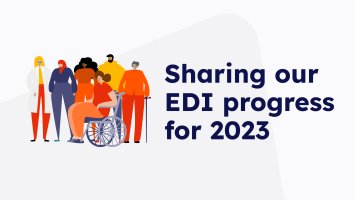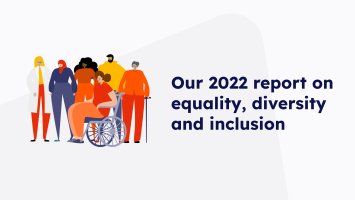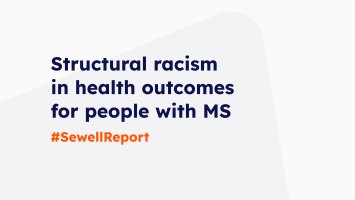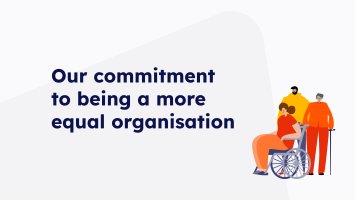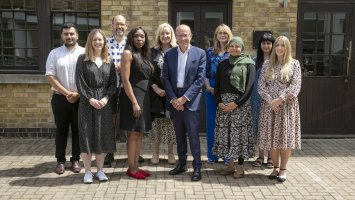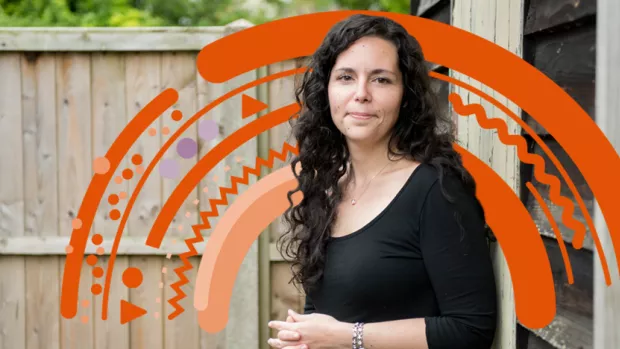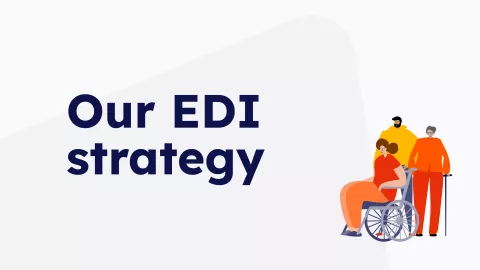
Our Equality, Diversity and Inclusion Strategy
From your insight and feedback, we’ve established a new strategy that puts diversity and inclusion front and centre of everything we do.
In September 2019, we approved a new organisational strategy for 2020-24. This Equality, Diversity and Inclusion (EDI) Strategy sets out how we will deliver on one very important part of it: “Putting diversity and inclusion front and centre”.
Help us deliver our strategy
We're looking for people to join our EDI Reference Group. Drop us an email to find out more.
Explore our strategy
1. Introduction
In September 2019, we approved a new organisational strategy for 2020-24. This Equality, Diversity and Inclusion (EDI) Strategy sets out how we will deliver on “Putting diversity and inclusion front and centre”. Our ambition is to put EDI at the heart of everything we do. So this strategy is relevant to all our functional strategies.
Our vision for this strategy is “We support each other so no one has to face MS alone. By recognising and respecting all our different lived experiences we will be stronger and our voice louder”. If we achieve this, we won’t need a dedicated EDI strategy anymore, because equality inclusion and diversity will be at the heart of all our work. This means a future where everyone affected by MS sees us as their fearless ally, whatever their age, ethnicity, gender, sexual orientation, beliefs, family or how much money they have. We believe our people (volunteers and staff) must reflect the true diversity of our MS community and wider society. We want everyone to feel included and empowered in their role, while also feeling they can be themselves.
These are goals worth fighting for not just because they are the right thing to do, but because a focus on EDI is core to achieving our wider goals for our community. If we value difference as one of our core strengths, we’ll be able to find a way to help anyone affected by MS. And we’ll do much better at making sure everyone hears about the support we offer.
We have designed the objectives underneath this vision to
- make us more diverse
- grow our reach so we’re achieving impact across our whole community
- make sure everyone feels included in what we do and how we do it.
If we don’t meet these objectives we’ll be less and less relevant in a changing society. We’ll further embed the inequalities in our community that are already far too wide. And we’ll struggle to recruit and retain the employees we need to realise our strategic goals.
2. Where we are now and why we need to change
Overall position
Over the last several years, we’ve made some progress in embedding equality, diversity and inclusion in our work. We undertook new research to deepen our understanding of different groups of people within the MS community, centred different types of lived experience using external milestones like Pride marches and Black History Month, established an internal network of EDI champions, and took steps to eliminate unconscious bias from our recruitment and management decisions.
However, if we are honest with ourselves, there has been a complacency to our work in this area. We have been content with incremental progress without going back to first principles and looking at how corporately we are living and perpetuating discriminatory norms. Our inaction has led to actual and perceived inequalities amongst our staff, volunteers and the MS community.
If we are equally honest, external events caused us to take a harder look at ourselves and our uneven progress around EDI. Most notably the conversation about systemic racism reignited in 2020 and some very concerning behaviour being uncovered at major charities in the UK, demonstrating the scale of systemic problems within the UK charity sector itself. These events have made the inequality our inaction is causing impossible to ignore any longer, but we shouldn’t have needed anything external to highlight this.
We know some people with MS from ethnic minorities can have higher levels of disability earlier in life, yet have lower access to healthcare. We also know that research into MS in ethnic minorities has not kept pace with our changing understanding of its prevalence. One study from the United States suggests that, contrary to what many believe, Black women may be at higher risk of MS than White women. While some of the MS-specific research is from the United States, evidence like the Marmot report shows similar inequalities exist in the UK.
The COVID-19 pandemic was a reminder of the tragic consequences of these kinds of inequalities in UK society. As well as further clear evidence (for anyone who doubted it) that the MS community is as unequal as any other. It has also highlighted the limits of our reach. During the pandemic we have had to confront the fact we simply do not have as many tools to help a person affected by MS who has low digital access, lower social capital, and a legacy of exclusion and discrimination that continues today and has led to mistrust in UK institutions. Despite the fact that in many ways these have been the people who have needed us the most.
This state of affairs is simply unacceptable. We believe a major reason for it is structural racism in the UK. Structural racism is where things like government policies, the education system and working culture continue to create inequalities in society based on a person’s ethnic background. We are not alone in this view. A wide range of experts agree, including leading clinicians writing in the British Medical Journal (BMJ). More importantly, so do people affected by MS.
We want to be there for everyone affected by MS. We know that means constant activity to combat all forms of exclusion and disadvantage, including systemic racism and conscious and unconscious bias – both in ourselves and others.
In summary, we have much, much further to go. Our work must be based on the clear evidence that some people with MS are affected by systemic racism and other forms of discrimination, as well as other areas of structural disadvantage and exclusion. Crucially multiple areas of disadvantage can create overlapping and interdependent consequences (intersectionality).
Many of the reasons for systemic racism relate to much wider social issues rather than our organisational behaviour alone, meaning we must work harder to counteract them. To date, we have not done so. We call the people we already know for a focus group or volunteering vacancy. We use our own lived experience as a short-hand reference point even when it does not align with our intended audience. Or we focus on changing government policy in the area they want to look at, rather than the uncomfortable one that would make the most difference on inequality, but where we have less chance of success.
We endorse the social model of disability: we believe people are disabled by barriers in society, not by their impairment or difference. Barriers can be physical, like buildings not having accessible toilets. Or they can be caused by people's attitudes to difference, like assuming disabled people can't do certain things. We can only advocate for government, employers and others to live this model if we are fully doing so ourselves. This is not the case currently.
History tells us clearly we can only break these cycles if the people who make up our organisation (our employees and volunteers) look, think and feel like all of the people we want to represent. This is not the case currently. In many ways our organisational culture perpetuates forms of systemic racism and other biases. We need to change who makes up our employees and volunteers. And challenge each other to look at where we might be perpetuating or even advancing systemic racism, ableism or ageism, however unconsciously.
Developing a new strategy
Over 2021 we have supported a searching conversations between staff, volunteers and people affected by MS seeking to answer a deceptively simple question: what would it take to truly change? We asked this question of ourselves and others, in many different ways: formal focus groups, interviews, informal chats, team meetings, written comments and more. It has led us in many different directions. Some were predictable (more EDI training) and some much less so (a new international collaboration around MS and equality).
Appendix 1 sets out a summary of the feedback and ideas we have received and Appendix 2 provides the available data around the current state of EDI at the MS Society. It includes results from recent employee surveys, current (imperfect) demographic data on staff and volunteers, and research into the lived experience of MS in different groups.
Overall, the feedback from employees, volunteers and people with MS acknowledges the complacency we talk about above. It also surfaced some concerning instances where people have felt excluded (on the basis of their race or age for example), with a focus on how to improve. Some people noted progress in recent years and that some of our existing wider initiatives – like creating more flexible volunteering roles, increased personalisation of our website, more systematic decision-making – naturally benefit our EDI agenda as well. However, people also highlighted clear areas for improvement. At leadership level, people do not feel that equality issues are adequately centred in decision-making. Another key point of feedback has been how much people’s experiences of equality and inclusion depend on their line manager – and that these experiences are not consistent. Many employees do not feel everyone has a consistent understanding of EDI principles and practices and are not clear on either expectations or the best ways to realise them.
We combined our recent qualitative work with employees, volunteers and people affected by MS with more quantitative data that we hold from previous projects assess the overall drivers for change set out below.
It’s important to remember we haven’t heard from everyone. Not all employees and volunteers have felt comfortable in contributing to the development of this EDI strategy. Part of our actions on the back of this must include a real focus on building this trust so that we can listen to and act on a full range of feedback, continuing to expand and refine our approach as we go further. Similarly, in the past we’ve tended to ask more consistently about age, gender, ethnicity and disability than about other characteristics like sexual orientation, religion, beliefs, or gender identity. This means that we have clearer (though not comprehensive) evidence of under-representation of some groups of people than of others. But we know that lack of evidence does not imply evidence to the contrary. Again, we will need to keep expanding our understanding and feed this into plans as we progress.
EDI: drivers for change
Inequality amongst people affected by MS. The pandemic has exposed stark inequalities across UK society. We cannot change this for people with MS without consistent focus across all of our impact areas – research, external affairs, services and support.
Inclusion of people affected by MS. Not all people affected by MS see the MS Society as for them. Research (as far back as our 2019 Clearview report) has highlighted a range of reasons for this, including lack of diversity in the people and experiences we use as case studies, a perception of an “institutional” tone of voice, experiences with Local Groups, and lack of awareness about what the MS Society can offer. We also know some people affected by MS do not feel we adequately focus on their experiences in our communications, or make it easy for them to be involved in our work.
Lack of employee diversity. Particularly at senior levels of the organisation, the diversity of our staff does not reflect the community we serve – most obviously in terms of ethnicity and disability, although we do not have the data to rule out other forms of under-representation either (for example, sexual orientation).
Employee inclusion. While our EDI survey in 2020 showed overall solid scores, there were significantly lower scores in some minority groups. A smaller survey in May 2021 suggests the overall picture may have slipped back. Work with employees has highlighted variable experiences of manager support and unequal development opportunities, as well as specific instances of people not feeling included because of their political beliefs, faith, ethnicity, gender or disability.
Lack of volunteer diversity and inclusion. We know our volunteer community is not very diverse, with people from ethnic minority heritage and younger people not well represented (and again other forms of under-representation possibly not yet identified). A recent internal report highlighted the fact that some volunteers from these backgrounds feel excluded because of their differences both in their local group (where relevant) and more generally in our work.
Lack of data, insights and evidence to support action in the above areas. We still have a long way to go in systematically gathering information on our employees, volunteers and broader community and turning this into actionable insights for example to help broaden our reach.
3. Our EDI vision
In light of these challenges and opportunities we have established an EDI vision for the next three years.
Our vision for this strategy is “We support each other so no one has to face MS alone. By recognising and respecting all our different lived experiences we will be stronger and our voice louder”.
If we achieve this, we won’t need a dedicated EDI strategy anymore, because equality inclusion and diversity will be at the heart of all our work. This means a future where everyone affected by MS sees us as their fearless ally, whatever their age, ethnicity, gender, sexual orientation, beliefs, family or how much money they have. We believe our people (volunteers and staff) must reflect the true diversity of our MS community and wider society. We want everyone to feel included and empowered in their role, and that they can be themselves.
4. Outcomes
Linked to this vision, we have identified five key outcomes we want to deliver. Each one directly supports our organisational goal of “Putting diversity and inclusion front and centre”.
- Reduced inequality in our community. With targeted services and campaigns, we will close the gap between those who do and do not receive systemic advantages in society.
- Increased engagement. We will engage the full spectrum of people affected by MS, using the channels and language that work best for them
- Employees reflect our community. Our employees will reflect the community we serve in terms of ethnicity, socioeconomics and lived experience
- Volunteers reflect our community. Our volunteers will reflect the community we serve in terms of ethnicity, age and lived experience
- Everyone can be themselves at the MS Society. We will create an organisational culture that celebrates difference so everyone is comfortable to be themselves
The specific measures we will use to assess our progress against these objectives are set out in Appendix 4.
5. Objectives
These are the six specific objectives we will pursue to deliver on these outcomes.
- Support and promote the voice of people who face discrimination. We will do more to understand the reach of our services. We will focus research on different groups of people with MS. And we will campaign on injustices that affect minoritised groups in our community. This will involve a continuous feedback loop of data and insight to inform how we develop and target our services and understand the impact of new approaches.
- Broadening our reach. We will deliver a programme of bespoke outreach to groups we struggle to engage, built on more insight work to understand the experiences of MS in different groups. This will include working with a range of other organisations and giving them a platform and other support. Through representative and inclusive co-production we can grow our impact to reach all segments of the MS community equally.
- More inclusive experiences for people affected by MS. We want to make sure any interaction someone has with us - volunteering, fundraising, using a service, getting involved in a campaign – will be as welcoming and accessible as possible. This includes local groups, volunteers’ experiences more widely, communications and other interactions. We must establish an infrastructure around volunteer expenses, digital inclusion, partnership working and insight that means we can reach a proportionate group of people affected by MS to involve in any project so we know the output of this work will contribute to a welcoming and accessible experience. We must also make sure that across all our communications we are examining our language and tone of voice. And how – and through what channels – we communicate so we can tailor how we talk to our different audiences.
- Recruiting and fostering diverse talent. We will continue to evolve our recruitment, learning and development offer and talent management to improve the diversity of our staff, particularly ethnic diversity at senior levels (Heads and Directors plus Board of Trustees). This will involve a dedicated a learning and development offer for employees from backgrounds that are currently underrepresented on leadership group, as well as further efforts to attract diverse candidates and ensure fair and inclusive recruitment and management processes.
- Recruiting and retaining diverse volunteers. We will widen our reach and attract a more diverse audience of volunteers through increasing our use of online recruitment, and break down the barriers to volunteering, ensuring roles are as flexible as possible. We will build a more inclusive culture by
- setting up courageous conversations to tackle prejudice
- building the capacity of volunteer managers to recruit and retain more diverse volunteers
- embedding a systematic approach to monitoring diversity characteristics.
- Building an inclusive culture. We recognise that building an inclusive culture is complex and requires multiple programmes of work, including all of the objectives set out above. In addition, we will build skills and confidence in identifying our own biases and micro-aggressions. As well as tackling racism or prejudice, where ever it occurs, across staff and volunteers. We will use a combination of training and support, internal communications opportunities, and wider employee and volunteer engagement to build a culture that celebrates difference. We will also review our policies to make sure we are supporting and valuing difference in all our guidance to managers and employees, including a commitment to taking action when behaviour is not appropriate. We will also embed EDI through decision-making at every level, including making sure all colleagues have an EDI objective in their formal objectives.
6. Enablers
Eight specific enablers will support the delivery of this strategy.
- Digital capacity. Broadening our reach and making sure we have an inclusive culture for people with MS requires a steady stream of strong digital content, built around a structured calendar of wider celebrations (for example, Ramadan, Black History Month). It also requires a concerted effort to make sure our content is inclusive (for example that pictures used on our website are diverse, all content meets accessibility guidelines).
- Developing partnerships. To continue to grow our reach and learning we will need to work closely with other MS organisations – and more widely. This will include greater support for existing organisations like the Black MS Foundation and Asian MS to lay the groundwork for potentially greater collaborations around outreach in the future. It will also include playing a leading role in coalition work around EDI, including for example the Neurological Alliance, National Voices and pan-charity diversity and inclusions networks.
- Trust. We will not be able to truly realise our vision on EDI until we have built more trust with colleagues, volunteers and people affected by MS. What has come through clearly in the strategy is that the best way of building trust is by taking action to show we take both EDI in general, and the experiences of people who’ve felt minoritised specifically, seriously. Therefore all of the objectives of the strategy contribute to a general enabler of increased trust that will in turn make our full ambitions possible to achieve.
- Data and insight. Several objectives of the strategy depend on strong data collection and analysis mechanisms. In particular, growing our reach and impact for different groups means we must work to understand both our current reach and the reasons we may be falling short with different groups. Perhaps even more important is continuing work to gather qualitative insight and survey responses from people who feel less empowered to engage in corporate work around EDI. This is closely related to the enabler about trust above.
- Leadership behaviour and accountability. Colleagues and volunteers in formal and informal leadership positions must model inclusivity and valuing equality. Our leaders must role model the behaviours we want to see, speak out against discrimination and challenge prejudice where they find it. Much of the culture change we see in this strategy will require concerted efforts from people in leadership positions (not just Trustees and the formal leadership group, but respected staff and volunteers like our staff reps, long-standing colleagues and volunteers). Similarly, the MS Society corporately must be accountable for progress in this area, including giving transparent updates to the community.
- HR investment and capacity. We must make significant investments in time and in some cases budget from the HR and Volunteering teams to take forward initiatives like apprenticeship schemes and EDI training. In addition, other aspects of the strategy will need a much wider effort and greater capacity. We cannot make the step changes set out in this strategy without prioritising its importance and investing.
- Programme management and general capacity. We’ll hire a dedicated role (EDI programme lead or similar) to coordinate cross-organisational working on EDI. The EDI programme has been built up over recent years through staff dedicating a small proportion of their time to EDI and fitting this around their day jobs. We want this to continue, but as we increase our ambition it’s clear we need a dedicated role to manage this complex programme and lead on or provide expert input into some projects (for example, political statements like on the Sewell report, research into lived experience, HR policy updates).
- Restricted funding. EDI is ripe for restricted funding bids. We should increasingly be able to leverage research, piloting of approaches to bring more resources into the programme. This is unlikely to be a substitute for internal investment in capacity however. Instead we’ll need internal capacity to get us to a point where successful restricted funding bids are likely.
7. Delivery plan, risks and mitigations
Read about the actions that underpin each of our objectives and an overview of our delivery plan for this Strategy over the coming 4 years in our EDI action plan.
There are a number of risks to the successful delivery of the EDI strategy. Read about risks in our action plan.
We have also developed a specific set of actions to improve diversity in research. These are set out in our EDI action plan for MS Society research you'll find in the side bar of this page.
8. Supporting information
There's an overall summary on a page of this strategy in Appendix 3.
You can find a schedule of the key performance indicators (KPIs) we will use to track our progress in delivering this EDI Strategy in Appendix 4. We will publish a public progress report against these KPIs at least annually
Appendix 1: Feedback from employees, volunteers and people affected by MS
Main themes from employee feedback
- Lack of trust in the organisation from some staff, leading to people not raising issues, not engaging with surveys, or not sharing their data. Many people pointed out that if their survey responses were handed directly to their Director, they would be clearly identifiable from their answers (like their age or team). There was a perception that the process for anonymisation was not clear or reliable. There was a similar issue around going to HR about non-inclusive behaviour or even bullying – that it would be clear who was raising it and therefore there could be repercussions.
- We need more in-depth training and engagement with staff on EDI concepts and how to apply them. Many people cited the way meetings are run as an example of where more training was needed. People with impairments were often not treated with consideration, for example using chat function while people are talking, overlong meetings without breaks. Another example is around political views, where disparaging comments about people who voted leave in the Brexit referendum were routine even at quite senior levels.
- Inconsistent experiences in managers and investment in learning and development (which also depends on individual managers). Some staff gave examples of what was clearly unacceptable behaviour by Managers such as refusing reasonable adjustments. However many others pointed to more subtle forms of discrimination – like particular team members always getting in-work development opportunities. Related to the point above, a number of staff wanted to see bespoke EDI training for managers.
- Recruitment processes still require improvement. Improvements like anonymous recruitment have been noted, but staff still feel that we could do more to attract diverse candidates and that our recruitment processes still disproportionately value presentation over substance (“who is good at interviews”, not “who is good at the job”).
- Another common question was whether we have enough information to underpin action in all aspects of EDI. Staff wanted to see more research into different experiences of MS and also pointed to a lack of data on both staff and our reach with people affected by MS.
- Need for improvement in how we treat disabled staff. Some quite specific, but very concerning feedback about how disabled staff have been treated. Many respondents also noted that disabled staff were disproportionately affected during the restructure of 2020. Staff would like to see clearer end-to-end management of the experiences of disabled staff, starting from before they join.
- Staff also noted some difficult issues around communication. It is difficult to reflect all types of experiences of MS without running the risk of alienating some people. The classic example is around advanced MS, where people affected by advanced MS understandably want us to reflect the reality of this experience. But doing so could also be very upsetting for newly diagnosed people, not all of whom will have a similar experience in their future. Another example is the tension between our focus on the social model of disability and our messaging around a cure for MS. Without careful handling the latter (while of course completely right as a goal) can undermine the former.
- Need for leadership that fosters a focus on EDI and an inclusive culture. Many people pointed out the lack of diversity within EG and the leadership group more widely. While ethnicity was most consistently highlighted, some people also pointed to a lack of socio-economic diversity and that this may lead to a disconnect with some parts of the workforce and wider community. Several staff viewed EDI as an “afterthought” when key decisions are taken, with the restructure the most common example cited, and pointed to this lack of diversity as potentially related.
- One thing nearly everyone said: actions not words. There is a suspicion from some staff that the MS Society is jumping on the bandwagon around EDI because it is so topical and looking to do the minimum to avoid any PR blowback. Understandably, only clear and concrete action will convince people otherwise.
Main themes from volunteer feedback
Based on one-to-one interviews – Feb – March 2021 and focus group in May 2021.
- Under-representation in terms of age and ethnicity has been felt keenly by a number of volunteers who have described being in a minority. For some, seeing us focus on diversity and inclusion is long overdue.
- Representation matters: feeling minoritised elicits different responses. A number of volunteers find it uncomfortable, a smaller percentage find it difficult and sometimes upsetting. The overwhelming response from under-represented volunteers interviewed, however, was that they feel better when they see another person like themselves in their volunteering experience.
- Under-representation is not an active exclusion in itself but the lack of proactivity in resolving the issue was commented on by some volunteers. Continued inaction will be seen as a proactive exclusion.
- A common finding across all ethnicities and ages was that local groups can feel intimidating and slow to accept difference and change. If they are serving one particular demographic (typically older, White women), local groups can feel ‘cliquey’ which sometimes led to volunteers feeling excluded. Volunteers can also find it hard to engage in some groups where volunteers’ MS is more progressed (and volunteers feel they can ‘see their future’, which is disheartening).
- Age affects inclusion. Younger volunteers across all ethnicities reflected that their age did initially feel like an issue. This feeling of ‘difference’ has broadly been managed in two ways: some volunteers had their worries overcome by a welcoming local team who made them feel valued in post. Others, especially younger Group Coordinators, began actively recruiting younger volunteers into their group. A few participants touched on incidences of other younger volunteers swiftly walking away from local groups.
- Volunteers of ethnic minority heritage were more likely to report micro-aggressions. In terms of actively feeling excluded, more volunteers of colour commented on the presence of micro-aggressions – subtle actions that reflect negative attitudes towards minoritised people – towards themselves. However not all volunteers of colour felt their race affected their experience. The nature of group dynamics, with ‘people being people’, was often cited as a reason for particular difficulties, no matter the demographic composition.
- In discussing what we could do to build a more diverse and inclusive culture, volunteers reflected on the need for training and for genuine community outreach. There were also a number of points about overall improvement to the volunteer journey (for example, in induction and ongoing support) that would help all volunteers feel better able to participate.
- Most volunteers were keen to state that there are plenty of opportunities for us to appeal to more diverse audiences and build a more inclusive culture. They were positive about the prospect of what we could do – and what we could do together.
Main themes from people affected by MS feedback
Based on one-to-one interviews in 2019 and (more recent focus groups facilitated by Diversity Matters), as well as regular input from the EDI reference group.
- Messaging is not always about what you are trying to communicate, it is also about the delivery and how it is received. Be more deliberate about being inclusive, ensuring diversity across all ways we represent ourselves, including our videos, photos and case studies. Be less top-down in our communications to be welcoming and “less NHS like” (meaning focussed on scientific or factual information more than personal stories) and use social media intentionally to reach wider.
- Make sure our messaging reflects the seriousness of MS and the needs of our advanced MS community, while balancing the need for newly-diagnosed people to be optimistic about their future and that MS isn’t “all doom and gloom”
- Empower people and encourage grassroots activism by providing ‘myth-busting’ data that helps minoritised people tackle prejudice and lack of awareness at a local level
- Cater to all the different types of people with MS, encouraging more young groups to get together and introducing video chat gatherings for people who are online but can’t move around.
- Be in constant communication with people, providing information as we are a trusted body. Offer starter packs to newly diagnosed people and provide updates regularly and let people know what is new.
- Raising the awareness of MS in the general public whilst raising the profile of the MS Society as an organisation for everyone who has MS. Raise more awareness and be more diverse.
- Emotional and one to one support. Give more advice on alternative treatment, be more independent and also provide more one to one support.
- Working together with MS nurses and MS doctors to push material and campaigns and dispel racist stereotypes that still exist within the medical profession. Consider whether we are reaching everyone that has been diagnosed.
Appendix 2: More background on MS and EDI
What we know about EDI and people affected by MS
See Appendix 1 for recent qualitative work with people affected by MS on what they would like to see from us.
Examples of external evidence
- There is some evidence that your likelihood of getting different MS, your response to certain DMTs, and the rate at which MS may cause disability all can vary depending on your ethnic background. People from ethnic minority backgrounds have also not been as well involved in clinical trials as white people which means that some estimates of DMT efficacy cannot be robustly applied to everyone. Much more research is needed to fully understand these disparities and the drivers for them. Read our response to the Sewell report to find out more
- A major report from Stonewall in 2018 highlighted very serious failings in how the UK health system cares for LGBTQ+ people. One of the more concerning findings was that “one in seven LGBT people (14 per cent) have avoided treatment for fear of discrimination because they're LGBT”. Evidence from Italy indicates these broader findings apply to LGBTQ+ people with MS.
Inspiring stories from our MS community
- Selection of blogs from people affected by MS about EDI issues (from our community blog)
- Black History Month means "I deserve to be here"
- What being Black with MS means to me
- Speaking up to improve services for Black people with MS
- Lessons from Barbara Jordan
- It’s time to listen to the unheard voices
- Coming out three times
- An LGBT MS'ers reflection
- MS and disability in the LGBTQ+ community
EDI and employees/volunteers
Volunteers
Internal monitoring of diversity characteristics is inconsistent, but we understand from our database, research and the MS Register that we are under-representative of younger people and people of ethnic minority heritage backgrounds. From the 2019 Volunteer Survey, we found our average volunteer age is 53, whilst 93% of our volunteers identified as White-British (1% identified as White Irish and 2% identified as White ‘Other’), meaning that only around 4% of volunteers identified being from ethnic minority heritage. This homogeneity is not only an issue in terms of inclusivity of experiences and the benefits derived from that, but also means we are not representing the diversity (and diverse needs) of MS communities.
Employee pay gaps
Our gender pay gap analyses have been showing a year-on-year improvement:
- April 2018: Median gap of 6.63% (mean 4.39%)
- April 2019: Median gap of 2.64% (mean 4.67%)
- April 2020: Median gap of 2.01% (mean 2.06%)
We hope to do our first ethnicity pay gap analysis in 2021. But this depends on whether we can collect enough categorisation data.
April to May 2021 staff survey
This survey is smaller sample size (around 30 staff) than the February 2020 statistics quoted below (231 staff). We’re including it for context, but it’s not directly comparable.
|
Survey questions and answers |
Strongly agree |
Agree |
Neither agree or disagree |
Disagree |
Strongly disagree |
|
The MS Society is an inclusive place to work |
0% |
61.10% |
30.60% |
5.60% |
2.80% |
|
All staff at the MS Society have equal opportunities to develop and progress |
2.80% |
22.20% |
25.00% |
36.10% |
13.90% |
|
I trust the organisation to handle sensitive data about me in an appropriate way |
2.70% |
40.50% |
40.50% |
16.20% |
0% |
|
The impact on different groups of people affected by MS is taken into account when decisions are made |
0% |
19.40% |
50.00% |
19.40% |
11.10% |
|
The impact on different groups of staff or volunteers is taken into account when decisions are made |
0% |
24.30% |
40.50% |
21.60% |
13.50% |
February 2020 staff survey
Results to EDI questions (based on responses from 231 colleagues)
|
Survey questions and answers |
Strongly agree |
Agree |
Neither agree or disagree |
Disagree |
Strongly disagree |
|
The people I work with are accepting of other people whatever their background |
42% |
45% |
10% |
3% |
0% |
|
The MS Society is an inclusive place to work |
17% |
59% |
16% |
6% |
6% |
|
The organisation has made me aware of its equality diversity an inclusion policies and practices |
16% |
55% |
18% |
9% |
9% |
|
I would feel comfortable reporting discrimination if I experienced it or saw it happen to others at work |
19% |
49% |
15% |
13% |
13% |
|
We provide equal opportunities for career progression for all employees regardless of age, ethnicity, gender, disability or sexual orientation |
18% |
41% |
28% |
10% |
10% |
|
I know what processes to follow to report discrimination at work |
14% |
48% |
18% |
17% |
3% |
When we looked at the responses of particular groups compared to the rest of the organisation, some groups were a little less positive in their responses. This includes people who said they were disabled and people from a Black Asian or minoritised ethnic background.
Some comments were provided in the open-comments question. But we don’t have enough detail to tell us why there is a difference of views and experience across a number of questions asked in our Q1 2020 staff engagement survey.
Appendix 3: Summary on a page
Drivers of change
- Inequality for people affected by MS: The pandemic has highlighted stark inequalities across UK society
- Inclusion of people affected by MS: Not all people affected by MS see the MS Society as for them
- Lack of employee diversity: The diversity of our staff does not reflect the community we serve
- Employee inclusion: Surveys show not all employees feel included at the MS Society, especially some minoritised groups
- Lack of volunteer diversity and inclusion: We know our volunteers are not diverse and some volunteers do not feel included
- Lack of insights and evidence to support action: We need to gather more information to generate actionable insights.
Vision
We support each other so no one has to face MS alone. By recognising and respecting all our different lived experiences we will be stronger and our voice louder. This means a future where people affected by MS feel that the MS Society is a fearless ally for them – and that is equally true regardless of their age, ethnicity, gender, sexual orientation, beliefs, family or how much money they have. We believe our workforce (both volunteers and staff) must reflect the true diversity of the MS community and wider society and feel included and empowered in their role while being themselves.
Outcomes
- Reduced inequality in our community: With targeted services and campaigns, we will close the gap between those who do and do not receive systemic advantages in society
- Increased engagement: We will engage the full spectrum of people affected by MS, using the channels and language that work best for them
- Employees reflect our community: Our employees will reflect the community we serve in terms of ethnicity, socioeconomics and lived experience
- Volunteers reflect our community: Our volunteers will reflects the community we serve in terms of ethnicity, socioeconomics and lived experience
- Everyone can be themselves at work: We will create an organisational culture that celebrates difference so everyone is comfortable to be themselves.
Objectives
- Support and promote voices of people who face discrimination: We will develop services that work for everyone, focus research on different groups, we will campaign on injustices that affect a minority of our community.
- Broadening our reach: Including more insight work to understand the experiences of different groups and dedicated, bespoke outreach to those groups we struggle to engage (working with partners)
- More inclusive experiences for people affected by MS: Including local groups, volunteers experiences more widely, communications and other interactions (for example our campaigns community)
- Recruiting and fostering diverse talent: We will continue to evolve our recruitment, learning and development offer and talent and succession planning to improve the diversity of our staff
- Recruiting and fostering diverse volunteer opportunities: We will continue to diversify our volunteering opportunities and build an inclusive culture amongst our volunteers
- Building an inclusive culture: We will use a combination of formal training, internal comms opportunities, and wider employee engagement to build a culture that celebrates difference.
Enablers
- Digital capacity: Broadening our reach and ensuring an inclusive culture for people with MS requires a strong digital content
- Developing partnerships: We will need closer working with other MS organisations – and more widely – to continue to grow and learn
- Trust: To realise our vision on EDI until we must build more trust across employees, volunteers and people affected by MS
- Data and insight: We need strong data collection, insight and analysis mechanisms, particularly to help grow our reach
- Leadership behaviour and accountability: Leaders must model inclusivity and valuing equality and are accountable for progress
- HR capacity: Significant investment in time from the HR team to take forward initiatives like apprenticeship schemes, EDI training
- Programme management and general resource: A dedicated role to coordinate cross-organisational working on EDI
- Restricted funding: EDI is ripe for restricted funding bids and we can leverage early progress into more resources for EDI overall.
Appendix 4: Key performance indicators (KPIs)
Support and promote the voices of people who face discrimination
What good looks like in 2022
- National and local campaigning proactively calls out inequality
- Consideration of EDI impacts embedded in decision-making for Board-level strategic decisions
- All staff will have EDI in annual objectives
What good looks like in 2023
- Full policy position on reducing inequality amongst people with MS, accompanied by dedicated campaigning
- EDI considerations embedded in all decision-making and project management processes
What good looks like in 2024
No more than 5% variation in access to health and care services compared to average for people with MS for:
- people with MS from ethnic minority backgrounds
- people with MS who say they are struggling on their income
Broadening our reach
What good looks like 2022 to 2024
Year-on-year improvements in the diversity of people who:
- access our services
- engage with us on social media or via our website
- get involved in our work (for example campaigning or joining our research network)
More inclusive experiences for people affected by MS
What good looks like 2022 to 2023
Year-on-year increase in the proportion of people from ethnic minority backgrounds and from lower socio-economic groups who respond to surveys saying the MS Society is for them.
What good looks like in 2024
No more than 5% difference between groups mentioned and overall scores. No more than 10% difference between any group mentioned in the Equality Act 2010 and overall scores.
Recruiting and fostering diverse talent
What good looks like 2022 to 2023
- Year on year increased diversity of candidates applying for roles
- Year on year increase in diversity of workforce at all levels
- Promotions of underrepresented groups at least as good as other categories
- Leavers report that dissatisfaction with EDI issues was not a factor in their decision to leave.
What good looks like in 2024
- Applicants for roles reflect the diversity of the population where the role is based
- Further increase in diversity of workforce at all levels
- Promotions reflect the diversity of workforce
- Leavers from minority groups express a positive account of their experience with us.

